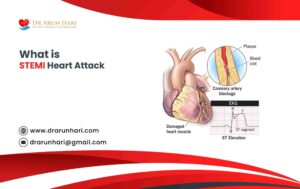Cardiac Intervention Meaning
Cardiac intervention refers to a set of minimally invasive procedures designed to diagnose, treat, and manage heart-related disorders. These procedures aim to open blocked arteries, restore normal blood flow, and prevent future cardiac events. Unlike traditional heart surgeries, which are often invasive and require longer recovery times, cardiac interventional techniques allow for faster recovery and improved outcomes.Why Cardiac Intervention Is Crucial
Ignoring symptoms of heart disease can lead to life-threatening conditions such as heart attacks, strokes, and heart failure. Timely cardiovascular intervention helps manage these risks and improves the patient’s quality of life. With advancements in technology and the expertise of specialists like Dr Arun Hari, patients now have access to safer and more effective heart intervention methods.Types of Cardiac Intervention Procedures
Cardiac intervention procedures include a variety of approaches aimed at restoring optimal heart function. These procedures are performed using catheters, balloons, and stents, often eliminating the need for open-heart surgery. Below are the most common types:1. Coronary Angioplasty and Stenting
A coronary angioplasty involves inserting a small balloon into the blocked artery to widen it. Following this, a stent (a small mesh tube) is placed to keep the artery open. This is one of the most common cardiac intervention procedures used to treat coronary artery disease.2. Atherectomy
Atherectomy is performed to remove plaque buildup in the arteries. This procedure is recommended when angioplasty alone may not be sufficient. It reduces blockages and restores smooth blood flow, minimizing the risk of future cardiac events.3. Balloon Valvuloplasty
This technique is used to treat narrowed heart valves. A balloon is inserted and inflated to open the valve and restore normal blood flow. It is commonly performed on patients with aortic stenosis or mitral stenosis.4. Pacemaker and ICD Implantation
Pacemakers and implantable cardioverter defibrillators (ICDs) are used to regulate abnormal heart rhythms. These devices send electrical impulses to control heart rate and prevent arrhythmias.5. Transcatheter Aortic Valve Replacement (TAVR)
TAVR is a minimally invasive procedure used to replace a narrowed aortic valve. This is often recommended for high-risk patients who may not be suitable candidates for open-heart surgery.How Dr Arun Hari Excels in Cardiac Interventional Care
As a leading cardiac interventionalist, Dr Arun Hari specializes in performing complex cardiac intervention procedures with precision and care. His expertise and state-of-the-art techniques ensure minimal discomfort and faster recovery for patients.Benefits of Cardiac Intervention
Cardiac interventional procedures offer numerous advantages, including:- Reduced Risk: Minimizes the risk of future heart attacks and strokes.
- Faster Recovery: Patients recover faster than with traditional open-heart surgeries.
- Minimally Invasive: Lower risk of complications and minimal scarring.
- Improved Quality of Life: Allows patients to return to their normal routines quickly.
Who Needs Cardiac Intervention?
Heart intervention is recommended for individuals with:- Severe chest pain (angina)
- Blocked arteries that restrict blood flow
- Irregular heart rhythms (arrhythmias)
- History of heart attacks or strokes
When to Consider a Consultation with Dr Arun Hari
If you are experiencing any symptoms of heart disease, it is essential to consult a specialist. Dr Arun Hari is a reputed cardiac interventionalist known for providing personalized and advanced care to his patients.How to Book an Appointment
To schedule a consultation with Dr Arun Hari for cardiac intervention, you can:- Fill out the appointment booking form.
- Call the number +971 544815774 to request an appointment.
- Send a WhatsApp message using the interface on the website to schedule a consultation.
Why Choose Dr Arun Hari for Cardiac Intervention?
Dr Arun Hari brings years of experience and specialized knowledge to the table, making him one of the best choices for cardiac intervention procedures. His patient-centric approach ensures that every treatment plan is tailored to meet individual needs.Summarizing on Cardiac Intervention
In conclusion, understanding what cardiac intervention is can empower patients to make informed decisions about their heart health. Thanks to innovations in cardiac interventional techniques, patients now have access to life-saving procedures that can enhance longevity and quality of life. Whether you need preventive care or advanced cardiovascular intervention, Dr Arun Hari is the trusted name to rely on.Act Now – Secure Your Heart’s Future ::contentReference[oaicite:2]{index=2}
Cardiac intervention refers to a series of minimally invasive procedures aimed at diagnosing and treating heart-related conditions. These procedures, performed by a specialized cardiac interventionalist like Dr. Arun Hari, address blocked arteries, valve disorders, and other cardiovascular issues to restore normal heart function.
Cardiac intervention meaning refers to the use of advanced, non-surgical techniques to treat various heart conditions, such as coronary artery disease and valve dysfunctions. It includes angioplasty, stent placement, and other procedures that open clogged arteries or repair damaged heart valves.
Cardiac intervention procedures are performed by a specialized medical professional known as a cardiac interventionalist. Dr. Arun Hari, a highly skilled cardiac interventionalist, has vast experience in conducting life-saving procedures such as coronary angioplasty, stenting, and transcatheter valve replacements.
Some of the most common cardiac intervention procedures performed by Dr. Arun Hari include:
- Coronary Angioplasty and Stenting: Used to widen blocked arteries and restore normal blood flow.
- Balloon Valvuloplasty: Treats narrowed heart valves by inflating a balloon inside the valve to increase blood flow.
- Pacemaker and ICD Implantation: Regulates abnormal heart rhythms and prevents sudden cardiac arrest.
- Atherectomy: Removes plaque buildup in arteries, improving blood flow.
- Transcatheter Aortic Valve Replacement (TAVR): Minimally invasive valve replacement for patients at high surgical risk.
No, cardiac intervention is a minimally invasive procedure that does not require large incisions like traditional open-heart surgery. It involves the use of catheters, balloons, and stents, reducing recovery time and lowering the risk of complications. This makes it a safer and faster option for many heart conditions.
A heart intervention is necessary when patients experience symptoms such as chest pain, shortness of breath, or signs of restricted blood flow to the heart. Individuals with high cholesterol, diabetes, or a history of heart attacks may also benefit from timely cardiovascular intervention to prevent further complications.
Cardiovascular intervention offers numerous benefits, including:
- Improved Blood Flow: Opens blocked arteries to enhance circulation.
- Reduced Risk: Minimizes the chances of heart attacks and strokes.
- Faster Recovery: Allows patients to resume daily activities quickly.
- Less Invasive: Lower risk of complications compared to open-heart surgery.
Dr. Arun Hari is a distinguished cardiac interventionalist known for his expertise in performing complex cardiac intervention procedures. His extensive experience, advanced knowledge, and patient-centered approach ensure optimal outcomes for every patient.
Booking an appointment with Dr. Arun Hari is simple and hassle-free. You can:
- Fill out the online appointment form.
- Call +971 544815774 to schedule a consultation.
- Send a WhatsApp message via the interface on the website for instant booking.
Yes, cardiac intervention is considered safe when performed by an experienced cardiac interventionalist. Modern advancements in technology and techniques used by experts like Dr. Arun Hari significantly reduce the risk of complications and improve patient outcomes.





